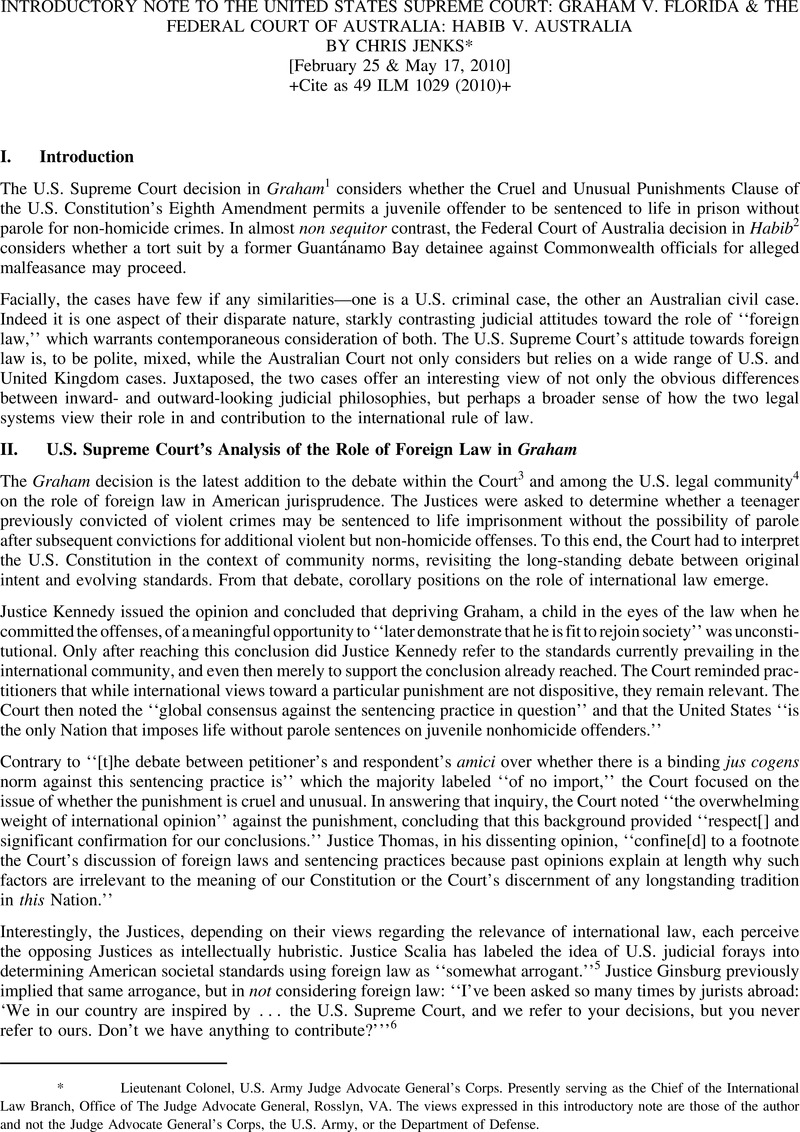Published online by Cambridge University Press: 27 February 2017

* This text was reproduced and reformatted from the text available at the U.S. Supreme Court website (visited June 1, 2010) http://www.supremecourt.gov/opinions/09pdf/08-7412.pdf.
1 Graham v. Florida, No. 08-7412 (U.S. May 17, 2010).
2 Habib v. Commonwealth of Australia [2010] FCAFC 12 (F.C. Austl.).
3 See Constitutional Relevance of Foreign Court Decisions, C-Span, Jan. 13, 2005, http://www.c-spanvideo.org/program/ 185122-1 (providing the conflicting views of Justices Scalia, who derides the relevance of foreign law, and Breyer, who views consideration of that same law as “opening your eyes “).
4 See, e.g., American Society of International Law, Judicial Application of International Law A Representative Listing of Current Journal Articles (2006), available at http://www.asil.org/pdfs/judappintllaw2006.pdf (listing two pages of articles).
5 Constitutional Relevance of Foreign Court Decisions, supra note 3.
6 Stephen Yeazell, When and How U.S. Courts Should Cite Foreign Law, 26 Const. Comment. 59, 60 (2009). See also Ruth Bader Ginsburg, Assoc. Justice, U.S. Supreme Court, A Decent Respect to the Opinions of [Human]kind: The Value of a Comparative Perspective in Constitutional Adjudication, Speech at the International Academy of Comparative Law, American University (July 30, 2010), available at http://www.supremecourt.gov/publicinfo/speeches/viewspeeches.aspx?Filename=sp_07_30_10.html (detailing her views of the role of international law to interpret U.S. law, including the Constitution). In her remarks, Justice Ginsburg stated that “[t]he U.S. judicial system will be the poorer, I have urged, if we do not both share our experience with, and learn from, legal systems with values and a commitment to democracy similar to our own. “
7 Habib specifically alleged that “officers of the Commonwealth committed the torts of misfeasance in public office and intentional but indirect infliction of harm by aiding, abetting and counselling his torture and other inhumane treatment by foreign officials while he was detained in Pakistan, Egypt and Afghanistan and at Guantańamo Bay. “ Moreover, he argued that [i]f officers. . .were found to have aided, abetted or counselled the commission of those offences, the officers would be taken to have committed those offences (s 11.2 of the Criminal Code Act 1995 (Cth)) and thus, Mr Habib alleges, to have acted beyond the scope of their lawful authority. “
8 For example, in October 2010, Oklahoma voters will vote on a proposed amendment to the State Constitution which would “make [Oklahoma State] courts rely on federal and state law when deciding cases. It would forbid [state] courts from looking at international law or Sharia law when deciding cases. “ Enrolled H.R.J. Res. 1056, 52nd Leg., 2nd Sess. (Okla. 2010), available at https://www.sos.ok.gov/documents/legislation/52nd/2010/2R/HJ/1056.pdf.
9 Sotomayor Confirmation Hearings, Day 3, N.Y. Times, Jul. 16, 2009, available at http://www.nytimes.com/2009/07/15/us/politics/15confirm-text.html?pagewanted=18 (detailing an answer by then Judge Sotomayor to a question from Senator Coburn on the use of foreign law, “foreign law cannot be used as a holding or a precedent, or to bind or to influence the outcome of a legal decision interpreting the Constitution or American law that doesn’t direct you to that law “). In response to a question from Senator Charles Grassley during her confirmation hearing on whether judges should ever look to foreign law for “good ideas, “ nominee Kagan replied
that I guess I’m in favor of good ideas coming from wherever you can get them. But I don’t think that foreign law should have independent precedential weight in any but a very, very narrow set of circumstances. So – so I would draw a distinction between looking wherever you can find them for good ideas, for -- just to expand your knowledge of the way in which judges approach legal issues, but – but making that very separate from using foreign law as – as precedent or as independent weight.
Senators Press Kagan on Military Recruiter Access, Abortion Rights, PBS News, June 29, 2010, http://www.pbs.org/newshour/bb/law/jan-june10/kagan1_06-29.html.
10 Adam Liptak, American Exception U.S. Court is Now Guiding Fewer Nations, N.Y. Times, Sept. 18, 2009, available at http://www.nytimes.com/2008/09/18/us/18legal.html (quoting then circuit court judge John Marshall in 1811 as saying, “It has been said that the decisions of British courts, made since the [American] Revolution, are not authority in this country. . . . I admit it – but they are entitled to that respect which is due to the opinions of wise men who have maturely studied the subject they decide. “).
11 Second Day of Hearings on the Nomination of Judge Roberts, N.Y. Times, Sept. 13, 2005, available at http://www.nytimes.com/2005/09/13/politics/politicsspecial1/13text-roberts.html?_r=&pagewanted=all (providing the transcript of the hearings on the nomination of Judge John G. Roberts); see also Noah Feldman, When Judges Make Foreign Policy, N.Y. Times, Sept. 28, 2008 available at http://www.nytimes.com/2008/09/28/magazine/28law-t.html (describing aspects of how conservatives and liberals view international law).
12 Liptak, supra note 10.